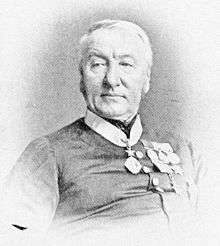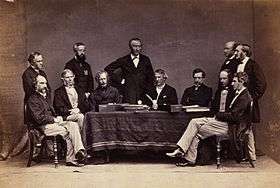Henry Marion Durand
| Sir Henry Marion Durand | |
|---|---|
 Sir Henry Durand | |
| Born | 6 November 1812 |
| Died |
1 January 1871 (aged 58) Tank, Pakistan |
| Allegiance |
|
| Service/branch |
|
| Years of service | 1828-1871 |
| Rank | Major General |
| Battles/wars |
First Anglo-Afghan War Second Anglo-Sikh War Indian Rebellion |
| Awards |
Knight Commander of the Order of the Star of India Companion of the Order of the Bath |
Major-General Sir Henry Marion Durand, KCSI CB (6 November 1812 – 1 January 1871) was a British Indian Army officer and colonial administrator.
Career

After training at the East India Company's Military Seminary at Addiscombe (1827-8), Durand left Britain for India in 1829, arriving in May 1830. He served initially as Second Lieutenant in the Bengal Engineers. He attained the rank of Major-General, and served in the First Anglo-Afghan War (1839–1842), and the Second Anglo-Sikh War (1848–1849). He also served as Commissioner of Tenasserim (1844–1846), as Resident of Gwalior (1849–1852), and Acting Resident of Baroda (March 1852 – March 1854). During the Indian Rebellion (1857–1858), he served as a military commander in western Malwa. Promoted to major-general,[1] he served finally as Lieutenant-Governor of the Punjab (1 June 1870 – 1 January 1871).
Family
Henry Marion Durand was one of two illegitimate sons of Major the Hon. Henry Percy and Mlle Marion Durand, a French woman he met while prisoner-of-war in the Napoleonic Wars. Percy became famous for bringing the news of the victory at Waterloo back to England. His son, Sir Henry Mortimer Durand, served in the Indian Civil Service and later in the British diplomatic service. He lived at Furness Lodge, East Sheen, Richmond.
Death
On the evening of 31 December 1870 Durand was thrown from an elephant as it attempted to pass under a low gateway in the city of Tonk (now Tank, Pakistan). He fell heavily, and died the following day.[2][3] He was buried in a church in Dera Ismail Khan, Khyber Pakhtunkhwa, Pakistan.
References
- ↑ The London Gazette: no. 23250. p. 2759. 14 May 1867. Retrieved 28 June 2015.
- ↑ Durand 1883, pp. 446–7.
- ↑ Vibart 1894, pp. 436–7.
 Stephen, Leslie, ed. (1888). "Durand, Henry Marion". Dictionary of National Biography. 16. London: Smith, Elder & Co.
Stephen, Leslie, ed. (1888). "Durand, Henry Marion". Dictionary of National Biography. 16. London: Smith, Elder & Co.
- Bibliography
- Campbell, Sir George (1879). The Afghan Frontier.
- Durand, Sir Henry (1879). The First Afghan War.
- Fraser-Tytler, Sir W.K. (1950). Afghanistan: A Study of Political Developments in Central Asia.
- Durand, H.M. (1883). The Life of Major-General Sir Henry Marion Durand, KCSI, CB, of the Royal Engineers. London: W.H. Allen.
- Vibart, H.M. (1894). Addiscombe: its heroes and men of note. Westminster: Archibald Constable. pp. 431–8.
External links
| Wikimedia Commons has media related to Sir Henry Durand. |
| Wikisource has original text related to this article: |